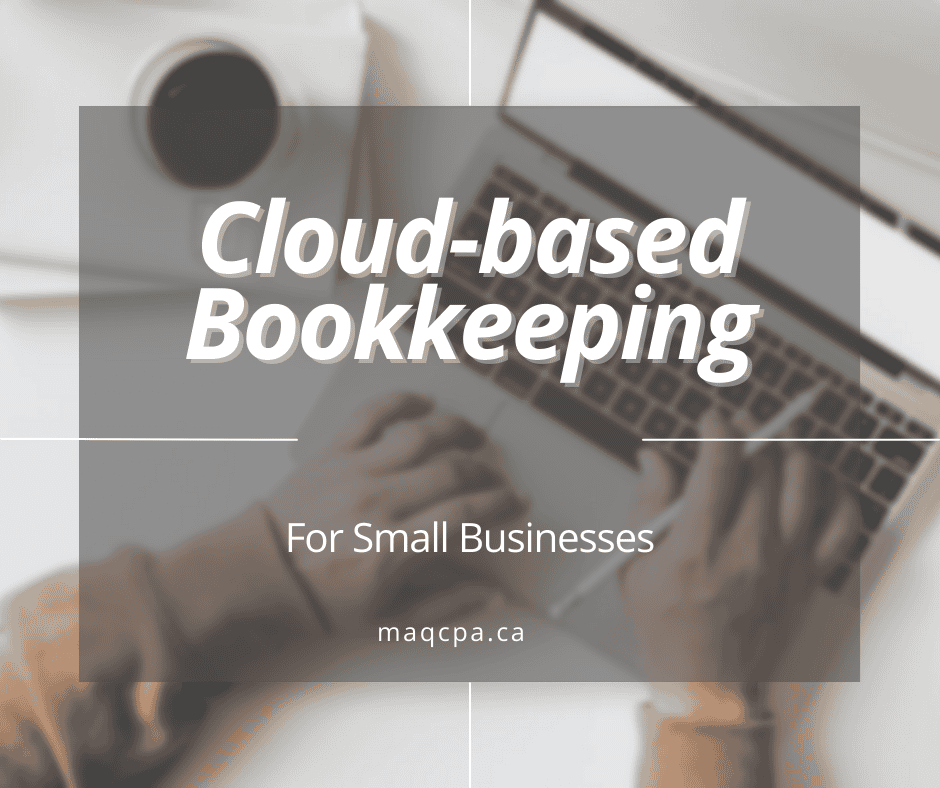5 Benefits of Cloud-Based Bookkeeping for Small Businesses in Canada

Introduction
Did you know that 70% of small businesses in Canada have switched to cloud-based bookkeeping? Here’s why you should consider making the switch, too. In this post, we’ll explore how cloud-based bookkeeping for small businesses can save time, money, and headaches while keeping financial data secure and accessible.
I. The Current Pitfalls of Traditional Bookkeeping
Time-Consuming
Traditional bookkeeping can be a lengthy and tedious process. From manually entering data into spreadsheets to reconciling accounts, it takes significant time, and small business owners often need help to spare. This time-consuming nature of traditional bookkeeping can distract you from focusing on core business activities that drive growth and profitability.
Risk of Human Error
Manual bookkeeping is prone to human error. Even a minor mistake in data entry or calculations can lead to significant discrepancies in financial records. These errors can result in incorrect financial statements, which can mislead decision-making and potentially attract regulatory penalties.
Accessibility Issues
Traditional bookkeeping often involves physical records and files stored in the office. This limitation means that access to financial data is restricted to when you are physically present at the office. In an age where remote work is becoming increasingly common, this can be a significant hindrance.
Cost of Physical Storage
Maintaining physical records requires substantial storage space, which can be costly for small businesses operating in urban areas where office space is expensive. Moreover, physical storage is susceptible to damage from fire, floods, and other disasters, posing a risk to the integrity of your financial records.
II. Introduction to Cloud-Based Bookkeeping
Cloud-based bookkeeping is using online software to manage your financial records and transactions. Unlike traditional bookkeeping, which relies on physical records or desktop software, cloud-based solutions store data on remote servers accessible via the Internet.
How It Works
Cloud-based bookkeeping involves using software applications that run on cloud servers. These applications allow you to input, store, and manage your financial data online. You can access these applications from any device with an internet connection, providing flexibility and convenience.
III. Key Benefits of Cloud-Based Bookkeeping
1. Accessibility and Flexibility
– Remote Access: One of the most significant advantages of cloud-based bookkeeping is accessing your financial records anytime. Whether you’re at home, on a business trip, or even on vacation, you can log in and manage your books. This flexibility is particularly beneficial for small business owners who must stay on top of their finances while juggling multiple responsibilities.
– Real-Time Updates: Cloud-based bookkeeping solutions provide real-time updates, ensuring your financial data is always current. This feature allows you to make informed decisions based on the latest information without waiting for monthly or quarterly reports.
2. Cost Savings
– Reduced Overhead: Cloud-based bookkeeping can significantly lower your operating costs by eliminating the need for physical storage and reducing the requirement for in-house accounting staff. According to a Canadian Federation of Independent Business (CFIB) report, small businesses can save up to 20% on bookkeeping costs by switching to cloud-based solutions.
– Scalability: Cloud-based solutions are highly scalable, meaning you can easily adjust the services to meet your business’s changing needs. Whether expanding your business or experiencing a temporary downturn, you only pay for what you need, making it cost-effective.
3. Enhanced Security
– Data Protection: Cloud service providers use advanced security measures to protect your data. These measures include encryption, secure access controls, and regular security audits. With data breaches becoming increasingly common, these robust security protocols are crucial for safeguarding financial information.
– Backup and Recovery: Cloud-based bookkeeping solutions typically offer automatic backups, ensuring your data is never lost. In case of a system failure or cyber-attack, you can quickly recover your data, minimizing downtime and potential losses.
4. Improved Accuracy and Efficiency
– Automation: Cloud-based bookkeeping software automates many routine tasks, such as data entry, transaction categorization, and reconciliation. This automation reduces the risk of human error and saves time, allowing you to focus on more strategic activities.
– Integration: These solutions can seamlessly integrate with other business tools and software, such as payroll systems, inventory management, and CRM platforms. This integration streamlines your business processes, enhances efficiency, and synchronizes all your financial data.
5. Environmental Impact
-Paperless Solutions: By transitioning to cloud-based bookkeeping, you reduce the need for paper documents, contributing to a greener environment. This reduction in paper use lowers your business’s carbon footprint and cuts down on the costs associated with printing and storing physical records.
– Energy Efficiency: Cloud providers often use energy-efficient data centers designed to minimize environmental impact. By leveraging these green technologies, your business can contribute to sustainability efforts.
IV. How to Transition to Cloud-Based Bookkeeping
Evaluate Your Needs
Before making the switch, assess your business’s specific needs. Consider factors such as the volume of transactions, the complexity of your financial processes, and your budget. This evaluation will help you choose the right cloud-based bookkeeping solution.
Choose the Right Provider
Selecting a reputable cloud-based bookkeeping service is crucial. Look for providers with a proven track record, robust security measures, and excellent customer support. Reading reviews and seeking recommendations from other small business owners can also help you make an informed decision.
Training and Support
Train your team adequately to use the new system. Many cloud-based bookkeeping providers offer training sessions and resources to help you get started. Additionally, having access to ongoing support can help address any issues during the transition.
Conclusion
Cloud-based bookkeeping offers numerous advantages for small businesses in Toronto, Canada, including remote access, cost savings, enhanced security, improved accuracy, and a positive environmental impact. By adopting this modern approach to bookkeeping, you can streamline your financial processes, reduce overhead costs, and focus on growing your business.
Ready to move your bookkeeping to the cloud? Contact us today for a free consultation and learn how we can help your small business thrive!
References
1. Canadian Federation of Independent Business (CFIB). “The Cost Savings of Cloud-Based Bookkeeping for Small Businesses.” 2023. CFIB Report.






